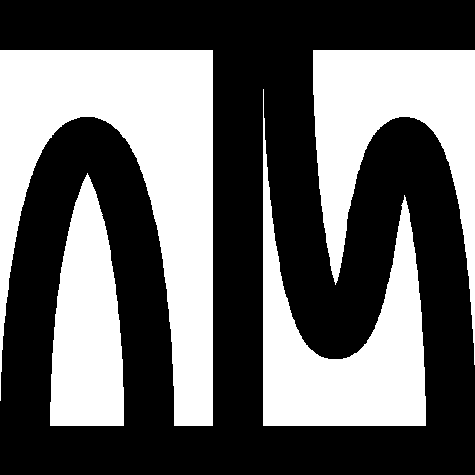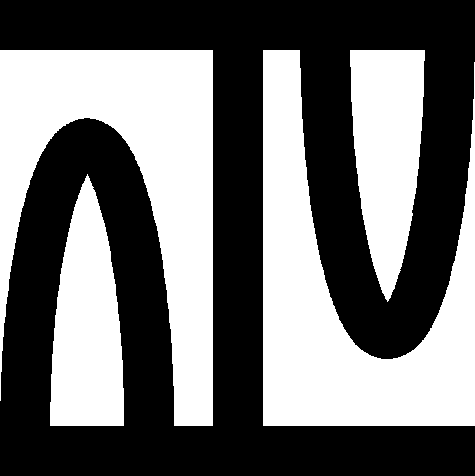:: NUMBERS semantic presentation 
 :: Showing IDV graph ... (Click the Palm Trees again to close it)
:: Showing IDV graph ... (Click the Palm Trees again to close it)
Lm1: one =
succ 0
by ORDINAL2:def 4
.=
1
;
:: deftheorem defines REAL NUMBERS:def 1 :
Lm2:
REAL+ c= REAL
definition
func COMPLEX -> set equals :: NUMBERS:def 2
((Funcs {0,one },REAL ) \ { x where x is Element of Funcs {0,one },REAL : x . one = 0 } ) \/ REAL ;
coherence
((Funcs {0,one },REAL ) \ { x where x is Element of Funcs {0,one },REAL : x . one = 0 } ) \/ REAL is set
;
func RAT -> set equals :: NUMBERS:def 3
(RAT+ \/ [:{0},RAT+ :]) \ {[0,0]};
coherence
(RAT+ \/ [:{0},RAT+ :]) \ {[0,0]} is set
;
func INT -> set equals :: NUMBERS:def 4
(NAT \/ [:{0},NAT :]) \ {[0,0]};
coherence
(NAT \/ [:{0},NAT :]) \ {[0,0]} is set
;
:: original: NATredefine func NAT -> Subset of
REAL ;
coherence
NAT is Subset of REAL
by Lm2, ARYTM_2:2, XBOOLE_1:1;
end;
:: deftheorem defines COMPLEX NUMBERS:def 2 :
:: deftheorem defines RAT NUMBERS:def 3 :
:: deftheorem defines INT NUMBERS:def 4 :
Lm3:
RAT+ c= RAT
Lm4:
NAT c= INT
Lm5:
for x, y, z being set st [x,y] = {z} holds
( z = {x} & x = y )
Lm6:
for a, b being Element of REAL holds not 0,one --> a,b in REAL
theorem Th1: :: NUMBERS:1 
 :: Showing IDV graph ... (Click the Palm Tree again to close it)
:: Showing IDV graph ... (Click the Palm Tree again to close it) 
Lm7:
RAT c= REAL
Lm8:
for i, j being ordinal Element of RAT+ st i in j holds
i < j
Lm9:
for i, j being ordinal Element of RAT+ st i c= j holds
i <=' j
Lm10: 2 =
succ 1
.=
(succ 0) \/ {1}
by ORDINAL1:def 1
.=
(0 \/ {0}) \/ {1}
by ORDINAL1:def 1
.=
{0,1}
by ENUMSET1:41
;
Lm11:
for i, k being natural Ordinal st i *^ i = 2 *^ k holds
ex k being natural Ordinal st i = 2 *^ k
1 in omega
;
then reconsider 1' = 1 as Element of RAT+ by ARYTM_3:34;
2 in omega
;
then reconsider two = 2 as ordinal Element of RAT+ by ARYTM_3:34;
Lm12:
one + one = two
Lm13:
for i being Element of RAT+ holds i + i = two *' i
theorem Th2: :: NUMBERS:2 
 :: Showing IDV graph ... (Click the Palm Tree again to close it)
:: Showing IDV graph ... (Click the Palm Tree again to close it) 
theorem Th3: :: NUMBERS:3 
 :: Showing IDV graph ... (Click the Palm Tree again to close it)
:: Showing IDV graph ... (Click the Palm Tree again to close it) 
Lm14:
INT c= RAT
theorem Th4: :: NUMBERS:4 
 :: Showing IDV graph ... (Click the Palm Tree again to close it)
:: Showing IDV graph ... (Click the Palm Tree again to close it) 
theorem Th5: :: NUMBERS:5 
 :: Showing IDV graph ... (Click the Palm Tree again to close it)
:: Showing IDV graph ... (Click the Palm Tree again to close it) 
theorem Th6: :: NUMBERS:6 
 :: Showing IDV graph ... (Click the Palm Tree again to close it)
:: Showing IDV graph ... (Click the Palm Tree again to close it) 
theorem Th7: :: NUMBERS:7 
 :: Showing IDV graph ... (Click the Palm Tree again to close it)
:: Showing IDV graph ... (Click the Palm Tree again to close it) 
theorem Th8: :: NUMBERS:8 
 :: Showing IDV graph ... (Click the Palm Tree again to close it)
:: Showing IDV graph ... (Click the Palm Tree again to close it) 
theorem Th9: :: NUMBERS:9 
 :: Showing IDV graph ... (Click the Palm Tree again to close it)
:: Showing IDV graph ... (Click the Palm Tree again to close it) 
theorem Th10: :: NUMBERS:10 
 :: Showing IDV graph ... (Click the Palm Tree again to close it)
:: Showing IDV graph ... (Click the Palm Tree again to close it) 
theorem :: NUMBERS:11 
 :: Showing IDV graph ... (Click the Palm Tree again to close it)
:: Showing IDV graph ... (Click the Palm Tree again to close it) 
theorem :: NUMBERS:12 
 :: Showing IDV graph ... (Click the Palm Tree again to close it)
:: Showing IDV graph ... (Click the Palm Tree again to close it) 
theorem :: NUMBERS:13 
 :: Showing IDV graph ... (Click the Palm Tree again to close it)
:: Showing IDV graph ... (Click the Palm Tree again to close it) 
theorem :: NUMBERS:14 
 :: Showing IDV graph ... (Click the Palm Tree again to close it)
:: Showing IDV graph ... (Click the Palm Tree again to close it) 
theorem :: NUMBERS:15 
 :: Showing IDV graph ... (Click the Palm Tree again to close it)
:: Showing IDV graph ... (Click the Palm Tree again to close it) 
theorem :: NUMBERS:16 
 :: Showing IDV graph ... (Click the Palm Tree again to close it)
:: Showing IDV graph ... (Click the Palm Tree again to close it) 
theorem :: NUMBERS:17 
 :: Showing IDV graph ... (Click the Palm Tree again to close it)
:: Showing IDV graph ... (Click the Palm Tree again to close it) 
theorem :: NUMBERS:18 
 :: Showing IDV graph ... (Click the Palm Tree again to close it)
:: Showing IDV graph ... (Click the Palm Tree again to close it) 
theorem :: NUMBERS:19 
 :: Showing IDV graph ... (Click the Palm Tree again to close it)
:: Showing IDV graph ... (Click the Palm Tree again to close it) 
theorem :: NUMBERS:20 
 :: Showing IDV graph ... (Click the Palm Tree again to close it)
:: Showing IDV graph ... (Click the Palm Tree again to close it) 
theorem :: NUMBERS:21 
 :: Showing IDV graph ... (Click the Palm Tree again to close it)
:: Showing IDV graph ... (Click the Palm Tree again to close it) 
theorem :: NUMBERS:22 
 :: Showing IDV graph ... (Click the Palm Tree again to close it)
:: Showing IDV graph ... (Click the Palm Tree again to close it) 
theorem :: NUMBERS:23 
 :: Showing IDV graph ... (Click the Palm Tree again to close it)
:: Showing IDV graph ... (Click the Palm Tree again to close it) 
theorem :: NUMBERS:24 
 :: Showing IDV graph ... (Click the Palm Tree again to close it)
:: Showing IDV graph ... (Click the Palm Tree again to close it) 
theorem :: NUMBERS:25 
 :: Showing IDV graph ... (Click the Palm Tree again to close it)
:: Showing IDV graph ... (Click the Palm Tree again to close it) 
theorem :: NUMBERS:26 
 :: Showing IDV graph ... (Click the Palm Tree again to close it)
:: Showing IDV graph ... (Click the Palm Tree again to close it) 
theorem :: NUMBERS:27 
 :: Showing IDV graph ... (Click the Palm Tree again to close it)
:: Showing IDV graph ... (Click the Palm Tree again to close it) 
theorem :: NUMBERS:28 
 :: Showing IDV graph ... (Click the Palm Tree again to close it)
:: Showing IDV graph ... (Click the Palm Tree again to close it) 
theorem :: NUMBERS:29 
 :: Showing IDV graph ... (Click the Palm Tree again to close it)
:: Showing IDV graph ... (Click the Palm Tree again to close it) 
theorem :: NUMBERS:30 
 :: Showing IDV graph ... (Click the Palm Tree again to close it)
:: Showing IDV graph ... (Click the Palm Tree again to close it) 






























